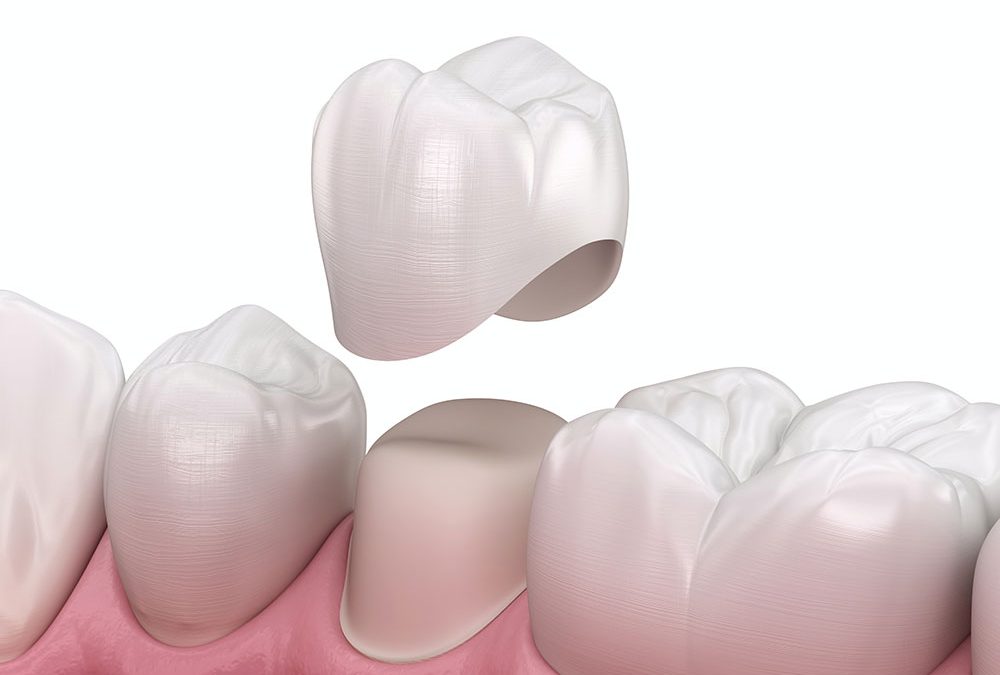
What You Should Know About Dental Crowns
What are dental crowns?
Dental crowns, more commonly referred to as dental caps, are a type of dental restoration involving placing a cap that covers the tooth or a dental implant to change its size and shape back to its original anatomy. Dental crowns help strengthen the tooth. A crown will be permanently cemented after it is placed on the tooth and fully covers the tooth above the gum line. Dental crowns can last 10-30 years, depending on the wear and tear, dental hygiene habits, and certain habits like clenching or grinding your teeth or biting your nails.
When do you need a dental crown?
Dental crowns are usually used to restore the appearance and function of teeth that have been fractured, worn out or broken unless more straightforward methods of dental restorations have proven more effective.
Dental crowns also serve aesthetic purposes for patients who are dissatisfied with the appearance of their teeth and can’t rely on simpler restorative or cosmetic procedures for their teeth or dental implants.
Lastly, patients who underwent endodontic treatment may benefit from crowns, which have been found to be very effective in stabilizing teeth and preventing the fracturing of fragile teeth. Since the cap encases the whole tooth, it will prevent it from further decay. Relying on crowns has also proven to be an excellent way to promote the normal development of the jawbone and jaw muscles.
Which crown is the best for you?
Crowns are available in various materials, such as gold, stainless steel, all resin, and all ceramic or porcelain fused to metal (also known as PFM crowns or veneered steel crowns).
The most commonly used crowns, especially for children, are stainless steel crowns, which are easily customized metal shells that can encase any tooth. Given their strength, durability and resistance to moisture, they are the crowns of choice for molars. Stainless crowns are the least expensive type of caps on the market.
A wide array of alloys can also be used for crowns, including silver, nickel and even titanium. But they are more challenging to adjust, may cause opposing teeth to wear and may not be suitable for patients with specific allergies.
Strip crowns are commonly used for front teeth and are more expensive than stainless steel crowns. Strip crowns made of resin or composite are transparent shells filled with tooth-coloured filling and then fitted over the tooth. Once the filling is set, the case is removed, leaving behind a material that looks exactly like a natural tooth.
How many visits to the dental clinic are required?
If you require a crown, you should expect two trips to your dental clinic. During the first visit, the dentist will examine and prepare your tooth for the procedure and will likely take a few x-rays to get a better view of the roots of your tooth and the bone around it. If significant decay or risk of infection is identified, the dentist may want to recommend a root canal treatment before placing a dental crown.
During the first visit, the tooth and its surrounding gum tissue will be numbed before the tooth can be reshaped to make enough room for the crown. The dentist will then make impressions of the tooth that will receive the crown and the teeth above and below that tooth to ensure that the procedure does not impact your bite. The impressions are then sent to a dental lab for production, and the crown will typically be ready within two to three weeks. The dentist may need to apply filling material if there is too much decay or damage in the area that requires dental restoration.
During your second visit, you will receive a local anesthetic before the crown can be placed over your tooth and cemented in place.
We would be happy to see you if you have any questions about dental crowns. Please call us today to schedule an appointment.
